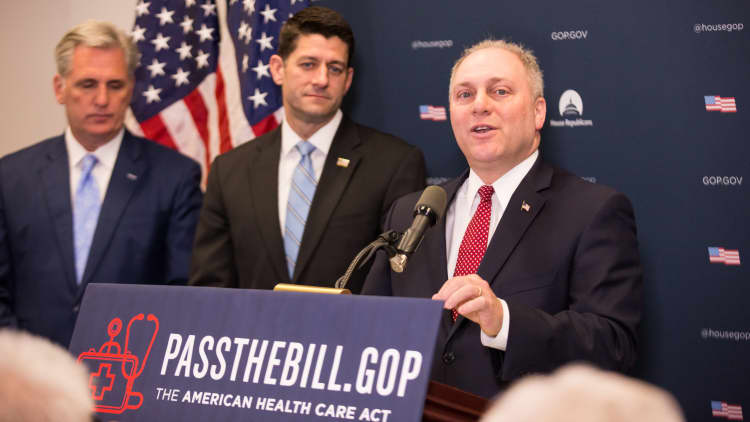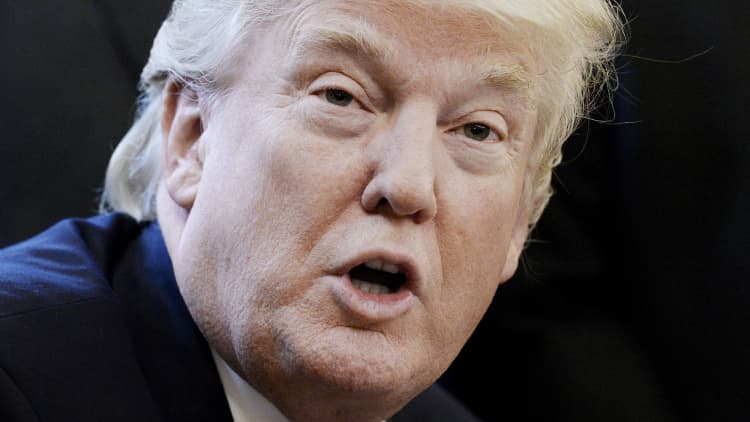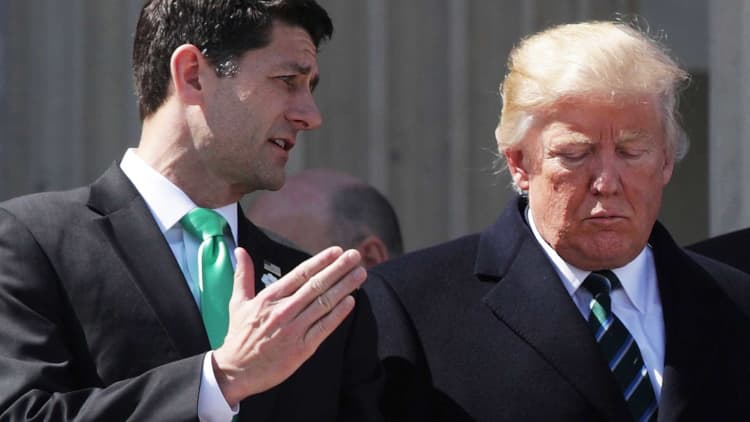
Republican House leaders on Tuesday vowed to continue working with their caucus on a plan to replace Obamacare with a new law, regardless of the GOP's humiliating failure in that effort last week.
But House Speaker Paul Ryan refused to commit to a timeline, despite Majority Whip Steve Scalise saying, "We're closer today to repealing Obamacare than we ever were before" and "more resolved than ever to repeal this law."
That reluctance by Ryan to publicly state a timeline raised further questions about the GOP's ability to achieve one of its biggest stated policy goals even though the party holds majorities in both chambers of Congress.
"I won't put a timeline on it, because it's too important to not get right and to put an artificial timeline on it," Ryan, R-Wis., told reporters at his weekly news conference after meeting with the Republican caucus.
"We want to get it right. We'll keep talking to each other until we get it right," Ryan said. "We'll figure out how to get this done."
"Obamacare is a collapsing law. It's doing too much damage to families," the speaker said. "We all want a system in health care where everyone can have access to affordable coverage."
That was Ryan's mantra for months as he pushed for a speedy repeal and replacement of Obamacare. While it's still his mantra, there may be less urgency in the effort now.
As he noted Tuesday, while Republicans will still work on health-care reform, "in the meantime, we're going to do all the other work that we came here to do."
"I don't want us to become a factionalized majority. I want us to become a unified majority," he said.
Ryan, President Donald Trump and other Republican leaders over a nearly three-week period had lobbied for a bill, the American Health Care Act, which would have repealed and replaced key parts of Obamacare. But the plan immediately ran into opposition from a number of hard-line conservatives in the House and right-wing think tanks outside of Congress, as well as to overwhelming opposition from House Democrats and defenders of the Affordable Care Act.
A number of moderate Republicans also expressed concern about the bill because of estimates it would lead to 24 million fewer people having health insurance by 2026 than would be insured under Obamacare. There was also worry that premiums in the first several years after the bill became law would actually be higher than they would be under Obamacare.

Last Friday, Ryan, with Trump's acquiescence, pulled the bill from the House floor just as it was due to be voted on after it became clear the plan would go down in defeat.
Democrats gloated about the failure of GOP leaders and Trump to get the bill to the Senate for consideration.
That failure also increased concerns that Republicans would run into trouble passing other parts of their agenda, particularly tax reform.
But Ryan said Tuesday that during the Republican caucus meeting, which he described as "very constructive," some members "who are in the 'no' camp expressed their willingness to working on getting to 'yes' and making this work."
Scalise, R-La., said, "The majority of our conference was already there" in supporting the bill.
"I think we're closer today to repealing Obamacare than we ever were before," he said. "This is not going to go away."
"The fact that our conference is more resolved than ever to repeal this law is very encouraging," Scalise said. "And we're not going to stop until we get this done."
Ryan said there is "frustration" in the Republican House caucus that the Obamacare replacement effort is using the process known as budget reconciliation.
In that process, a bill, which must have impact on the federal budget, requires just a simple majority of votes in the Senate to become law. Other, nonbudgetary bills require at least 60 votes to avoid the prospect of a filibuster.
The GOP holds just 52 seats in the Senate. And the party currently has little or no hope of winning eight Democrats to its side for a bill that would scale back Obamacare.
While some conservatives favor a total repeal of Obamacare, at least as a first step, Ryan and Trump, along with many other Republicans are insisting that there be a replacement plan that would mitigate the effects of repealing parts of the current law. A total repeal would be difficult to get passed in the Senate.
Ryan said that reconciliation remains "the way to go" for the GOP replacement effort.
However, even if Republicans get a replacement bill passed in the House, it still may be difficult to win passage in the Senate, as a number of Republicans there had voiced opposition to reducing the number of insured under the Medicaid program and to defunding Planned Parenthood, as the AHCA would have done.
Watch: Ryan says we don't want government-run health care



